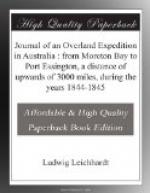I frequently tasted the fine-looking fruit of the Pandanus, but was every time severely punished with sore lips and a blistered tongue; and the first time that I ate it, I was attacked by a violent diarrhoea. I could not make out how the natives neutralized the noxious properties of the fruit; which, from the large heaps in their camps, seemed to form no small portion of their food. The fruit appeared either to have been soaked, or roasted and broken, to obtain the kernels; for which purpose we invariably found large flat stones and pebbles to pound them with. I supposed that they washed out the sweet mealy matter contained between the stringy fibres, and that they drank the liquid, as they do with the honey; and that their large koolimans which we had occasionally seen, were used for the purpose. I, consequently, gathered some very ripe fruit, scraped the soft part with a knife, and washed it until all the sweet substance was out, and then boiled it; by which process it lost almost all its sharpness, had a very pleasant taste, and, taken in moderate quantities, did not affect the bowels. The fruit should be so ripe as to be ready to drop from the tree.
Sept. 13.—We travelled about ten miles N. 50 degrees W., through a succession of tea-tree and Cypress pine thickets of the worst description, interrupted by three creeks, the first dry, the second with pools of brackish water, and the third with chains of Nymphaea ponds within and parallel to its bed. We came at last to the steep banks of a salt-water creek densely covered with Cypress pine scrub, and followed it for several miles up to its head, when two kites betrayed to us a fine lagoon, surrounded with Polygonums and good pasture. The natives were either able to drink very brackish water, or they carried the necessary supply of fresh water to these Pandanus groves, at which they had evidently remained a long time to gather the fruit.
Sept. 14.—We travelled three or four miles north-west, through a tea-tree forest, when the country opened, and a broad salt-water river intercepted our course. It came from W.S.W., and went to E.N.E. We proceeded eight or ten miles along its banks before we came to fresh water. In its immediate neighbourhood, the country was beautifully grassed, and openly timbered with bloodwood, stringy-bark, the leguminous Ironbark, and the white-barked tree of the Abel Tasman. Over the short space of eight miles we saw at least one hundred emus, in flocks of three, five, ten, and even more, at a time: they had been attracted here by the young herbage. We killed seven of them, but they were not fat, and none seemed more than a year old. The extraordinary success induced me to call this river, the “Seven Emu River.”




